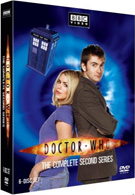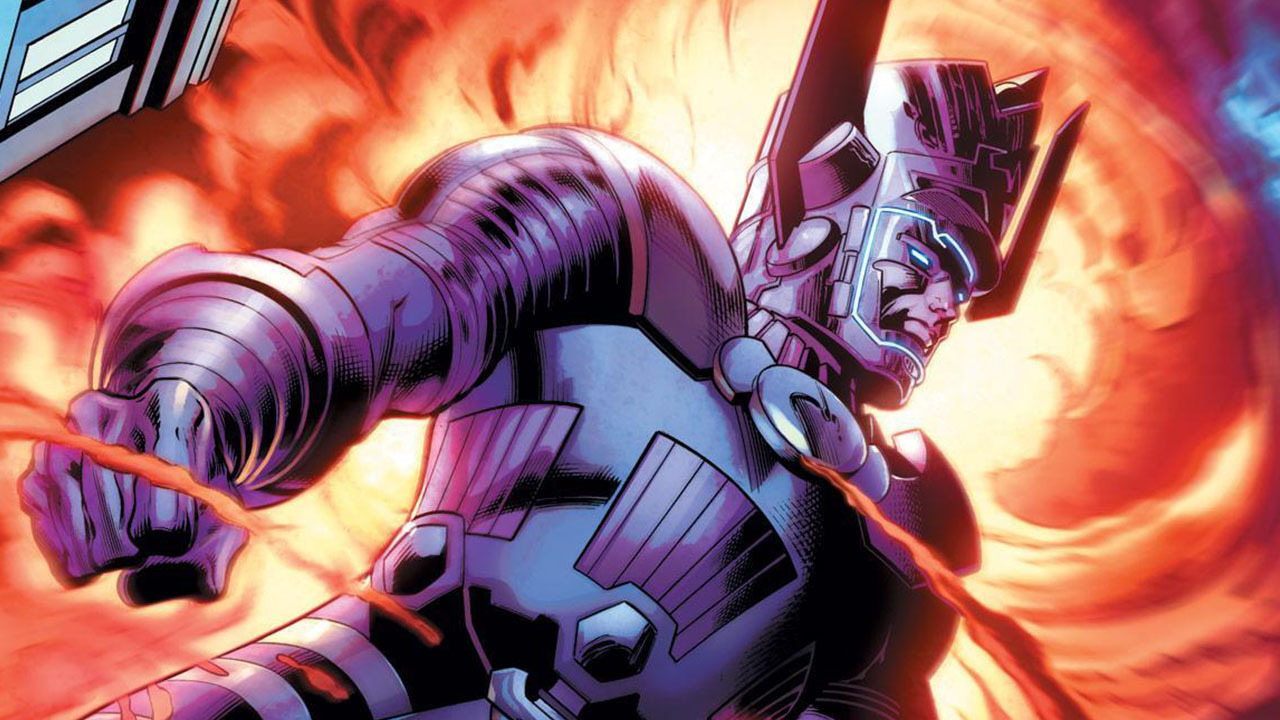I have to admit I wasn’t much of a fan of “Doctor Who” before the new version of the show. I had a passing familiarity with the show – they retract your science fiction geek status if you don’t know what a Dalek or the TARDIS is – but I seldom tuned in to the hours of repeats during my youth, although I still remember when they were on. In truth, it was the casting of Christopher Eccleston as The Doctor that got me to watch the show. His portrayal of The Doctor was full of life and vigor, very different from the stuffy, formal character I had built up in my head. Unfortunately, Eccleston’s stint as the title character was short lived, only lasting the first series. With an unfamiliar actor taking over the role, my interest waned and I stopped watching. That was a big mistake, because David Tennant is as worthy a successor to Eccleston as you can get, continuing to breath new life into an old character. For those unfamiliar with “Doctor Who,” the premise is rather simple. A mysterious figure known simply as “The Doctor” travels through time and space in his vehicle known as the TARDIS (Time And Relative Dimension In Space). He is typically accompanied by a companion. Along the way they have great adventures. There really isn’t a driving force behind when and where The Doctor and his companion go – no “Quantum Leap” need to put right what once went wrong or “Voyagers” drive to correct time. They just go on adventures. This sort of thing has been going on since the ‘60s, on and off of course, and yet it never seems to get old to the devoted fans.
The underlying theme of Tennant’s second series of “Doctor Who” (this is British television which measures itself in series instead of seasons) could be easily summed up as “Birth and Death.” The series opens with the rebirth of The Doctor and ends with the death of a major character, with numerous adventures falling in between.
The “birth” of the latest regeneration of The Doctor gives David Tennant some marvelous opportunity to discover just what kind of man he is while explaining to new viewers the concept of The Doctor’s regeneration. Rather than having a new character every time an actor wants to move on or dies, The Doctor cheats death by regenerating. He maintains all his knowledge and memories but the body changes, as does the personality behind it. Where Eccleston was a roguish figure, excited by new discovery, and clad in a leather jacket, Tennant restores some of the formality of the character in his pinstripe suit. He is, however, still clearly connected to Eccleston’s portrayal of the character. He is incredibly witty and charged by discovery, but he is also not a man to be crossed. “You only get one warning, that’s the sort of man I am,” he warns an alien race encountered during the season. Still, The Doctor is a champion for humanity, making him an excellent heroic figure.
The “death” is that of the doctor’s latest companion, Rose Tyler. It’s not really a spoiler to mention that. At the beginning of the episode that starts the final storyline, Rose herself introduces it as “this is how I died.” As Rose Tyler, Billie Piper was a controversial choice. The pop pin-up girl was England’s version of Brittany Spears, and you can imagine what public response would be if Spears suddenly showed up as a cast member on a tried and true franchise. Over her two seasons, Piper really showed herself worthy of traveling with The Doctor. The loss of her character is an interesting solution to a question poised earlier in the season when Rose meets one of The Doctor’s previous companions: is traveling with The Doctor and then being left behind all there is, leaving companions to desire more out of life than they can have due to their travels with The Doctor? Rose’s answer is a simple no – she is more than that, although her “death” is anything but simple – mirroring the “birth” of The Doctor that opens the season. In the end, what was one a bit of a controversy becomes a memorable character of the “Doctor Who” mythos.
Between the birth and death that bookend the season, The Doctor and Rose have quite a few excellent adventures, although looking at them all at once points out some of the flaws of Russell T. Davies’s writing. For a vehicle that can go anywhere in time and space, the protagonists seem to return to the same places in time repeatedly. If it’s not one specific era of the future, facing off against Lady Cassandra and encountering the Face of Boe, they are either in Rose’s native time getting help from her mother and ex-boyfriend Mickey (who I still say the word “ponce” was created to describe, although that changes a bit over the series) or visiting Victorian England. And if it’s not the same locations, it’s the same old villains. I’ll give “Who” fans the need for the Daleks, The Doctor’s main antagonist over the show as a whole, because not having them show up would make Tennant the first incarnation of the character who hadn’t faced off with the overgrown trash cans, but couldn’t Davies come up with some originality instead of revolving around two or three eras and antagonists? The show also spends a lot of notable time building up “Torchwood,” which would become a spin-off series for the show. For a show that managed to subtly hint at “big bad wolf” during Eccleston’s series, the Torchwood references are anything but subtle here.
As an ongoing saga, “Doctor Who” is always going to have some obvious weaknesses. The visual effects frequently leave something to be desired, although at times they can be quite excellent (the rendered werewolf is quite impressive for the series). Budgetary constraints are going to limit the show in just how far The Doctor and his companion can travel within a series if sets have to be reused. But there is some very good storytelling going on here. David Tennant shows that the success of “Doctor Who” still lies in who’s wielding the title of The Doctor, but that he is a worthy regeneration to carry the character and the show into the future. The “Doctor Who: The complete Second Series” DVD set includes fourteen episodes spread over five discs. That’s the thirteen episodes of the regular series, plus “The Holiday Invasion” Christmas special, which really introduced David Tennant as the new Doctor. The set is heavily loaded with extras including commentaries of some type on all the episodes, deleted scenes, outtakes, and a huge featurette about the show on a sixth disc.
Each disc typically contains three episodes. Of those three episodes, two contain an audio commentary and one has an “In-Vision” commentary, which is an overlayed video box that shows the commentators speaking. The commentaries are typically quite insightful, sharing some of the rigors of creating a BBC series, particularly one with such a huge canon as “Doctor Who”. For my tastes, the “In-Vision” commentaries are a bit of a novelty and weren’t really needed. I’d much rather have just heard voices and seen the episode on the whole screen rather than lose part of the screen to see who is speaking.
The first disc is probably my biggest complaint about the whole release. The first disc includes “The Christmas Invasion” and the first episode of the regular series. It also contains a seven-minute short created for “Children In Need”. Chronologically, this bridges the gap between the end of Christopher Eccleston (actually showing his sacrifice again) and David Tennant taking over the part, explaining why the TARDIS is going to crash as it does at the beginning of “The Christmas Invasion”. Oddly, though, it is placed away from the episodes on the disc. This means if you watch the episodes and then the bonus material like I do, you’ll see the episodes and then watch the setup for the first episode you watched. This should have been included in the “Play All” option for the episodes and been placed in a chronologically sensible location.
The other problem with the first disc is that it’s where the outtakes and deleted scenes are located. When I clicked on them I thought this was like other television releases where deleted scenes accompanied the appropriate episodes. Not so – all of the deleted scenes are on the first disc, which means you’ll see deleted material from episodes you haven’t even watched yet if you see this disc first. Otherwise, you have to return to the deleted material after you’ve finished the series, which I typically forget to do if it’s located in one place like this. It’s not a huge problem, but it’s a bit counter-instinctive for placement.
The “Doctor Who Confidential” on disc six is a phenomenal look at how the show is made. While the commentaries give us insight into each episodes trials, these “Confidential Cut Downs” really show how the series is made. Each section of the Confidential ties into one of the regular series episodes and explores how that episode fits in, Tennant’s role as The Doctor, and how all of that fits into the “Doctor Who” mythology as a whole. The “Cut Downs” are a bit spoilerish so it’s appropriate they are on the final disc of the series, although I almost wish they had divided them up and placed them with their respective episodes. Other bonus material in the set includes video diaries by David Tennant and Billie Piper.
For fans of “Doctor Who” the second series on DVD is a no-brainer. For less devoted fans like me, who were drawn in by one actor, the set might help persuade you to remain involved in the ongoing “Doctor Who” saga. Either way, if “Doctor Who” has any appeal to you whatsoever, this is one DVD set that’s worth a look.
The Fantastic Four: First Steps Director Thankfully Didn't Rely Solely On Motion-Capture To Bring Galactus To Life, And I Couldn’t Be Happier With This Approach
Wait, Is Cate Blanchett Planning To Retire From Acting? Here’s What The Actress Says
If You Like Drop, There's Another Real Time Thriller You Need To Watch Immediately











